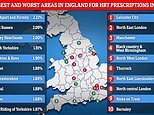Parts of the country are dishing out THREE TIMES as much HRT as others
Revealed, England’s HRT postcode lottery: Parts of country are dishing out FOUR TIMES as many gels, tablets and patches to ward off hot flushes in menopausal women
Some parts of England have quadruple rate of HRT prescriptions than othersSouthport and Formby had the highest % of HRT, and Leicester City the lowestWomen can suffer a postcode lottery in getting HRT with some GPs unaware of it Soaring demand for the menopausal treatment has fuelled a black market trade
<!–
<!–
<!–<!–
<!–
(function (src, d, tag){
var s = d.createElement(tag), prev = d.getElementsByTagName(tag)[0];
s.src = src;
prev.parentNode.insertBefore(s, prev);
}(“https://www.dailymail.co.uk/static/gunther/1.17.0/async_bundle- -.js”, document, “script”));
<!–
DM.loadCSS(“https://www.dailymail.co.uk/static/gunther/gunther-2159/video_bundle- -.css”);
<!–
England’s postcode lottery for menopausal women seeking hormone replacement therapy (HRT) has been laid bare today.
NHS data seen by MailOnline shows how some areas of the country are four times as likely to prescribe the gels, patches, and pills than others.
While 2.2 per cent of patients in Southport and Formby in Merseyside were given the drugs in 2020, the share was just 0.53 per cent in Leicester City.
The disparity comes amid growing demand and ongoing shortages for HRT, which has led to desperate women turning to the black market.
All of the top ranked HRT areas include rural and affluent areas like Gloucestershire, Dorset, Cornwall and Surrey. In contrast, low performers were typically in urban centres like London and Manchester.
Clamour for HRT has surged in the past five years, which has been attributed to more awareness and fading stigma about the menopause.
The latest NHS figures shows there were 3.2million prescriptions issued for HRT medications in 2020, up almost 40 per cent compared to four years prior.
This surge in demand has outstripped supply, causing shortages of some of the most popular forms of the therapy – a problem made worse by the pandemic.
This map reveals the top 10 best and worst areas in England for people to be prescribed hormone replacement therapy medications based on their entire population. Southport and Formby in Merseyside enjoyed the highest level in the country at 2.2 per cent whereas as Leicester City had the lowest at just 0.54 per cent
Every year, roughly 1.5million women experience menopausal symptoms, including hot flushes, night sweats, anxiety, reduced sex drive, and memory problems that impact all areas of their lives.
HRT can help alleviate these symptoms as women undergo the menopause but only a fraction actually get treatment.
NHS prescription data from England’s 106 Clinical Commissioning Groups (CCG) shows that women in the country’s commuter belts and popular retirement spots are the most likely to be prescribed HRT.
Popular costal retirement areas like Dorset and Devon were HRT hotspots, recording prescription rates of 1.89 and 1.88 per cent, respectively.
Meanwhile, North West London and North central London recorded rates of 0.76 and 0.87 per cent, respectively, meaning a total of three of the capital’s CCG’s featured in the bottom 10 in England.
Responding to the data, Dr Haitham Hamoda, chair of the British Menopause Society, said the disparity in prescription rates could largely be due to demographic differences.
‘Areas where more women over the age of 40 live are likely to have higher prescribing rates compared to areas with a younger demographic,’ he said.
However, he added that some women struggling with mesopause did experience artificial barriers to accessing HRT.
‘We do know however that booking doctor’s appointments and paying for HRT can act as barriers to some women when it comes to accessing support,’ he said.
‘That’s why we support reduced costs and longer prescribing cycles for HRT.’
In 2020, women in their 50s took the lion’s share of HRT medications, accounting for 1.7million prescriptions, followed by women in their 40s with 600,000 prescriptions and women in their 60s with 500,000 prescriptions.
The total cost of these prescriptions to the NHS was £45million.
NHS England provided HRT prescription data based out of the entire area population, not just women.
While data only covers 2020, the first year of the pandemic, ministers this month were forced to admit women continue to face a postcode lottery for HRT with some GPs unaware they can even prescribe the medications.
Minister for patient safety and primary care, Maria Caulfield, told MPs from the Commons women and equalities committee that standards are a ‘bit hit and miss’, with patients in different parts of the country getting a ‘very different service’.
Supply chain issues and a shortage of key ingredients have led to the patients who do come forward for HRT struggling to get access.
Some GPs are unaware of the shortages – meaning they continue to prescribe HRT, only for their patients to go to their pharmacy and be told it is out of stock.
Women are having to switch their HRT medication, sometimes causing the return of symptoms as the body gets used to the new drug.
Hormone replacement therapy is a treatment that helps alleviate the symptoms of the menopause but women in England have experienced disparity in accessing it
Current guidelines allow GPs to issue a year’s worth of HRT on a single prescription, fuelling ongoing supply shortages that have led to a black market trade.
Earlier this month it was revealed some menopausal women hit by the shortages were being charged up to £50 for a single bottle online or trading prescriptions with others on social media.
A new system, to be implemented next year, would allow a woman to pay a one-off annual fee and collect the HRT each month without needing to see their GP.
Some types of HRT slightly increase the risk of breast cancer and blood clots in some women, but the NHS says risks are small and are usually outweighed by the benefits.
![]()


